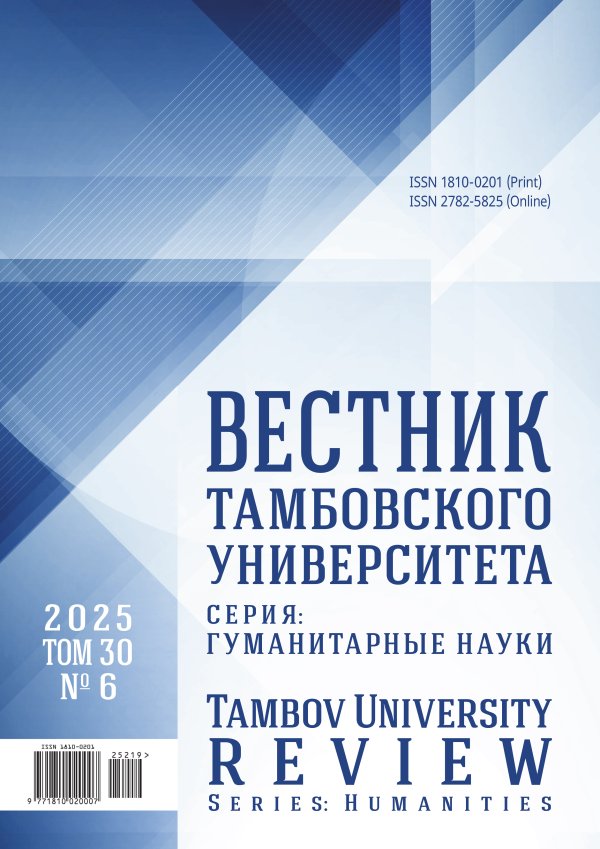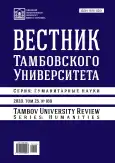Офицеры Русской императорской армии в составе противоборствующих сторон Тамбовского восстания 1920–1921 гг.
- Авторы: Канищев В.В.1
-
Учреждения:
- ФГБОУ ВО «Тамбовский государственный университет им. Г.Р. Державина»
- Выпуск: Том 25, № 189 (2020)
- Страницы: 234-244
- Раздел: ОТЕЧЕСТВЕННАЯ ИСТОРИЯ
- URL: https://journal-vniispk.ru/1810-0201/article/view/298859
- DOI: https://doi.org/10.20310/1810-0201-2020-25-189-234-244
- ID: 298859
Цитировать
Полный текст
Аннотация
Рассмотрен новый аспект в целом хорошо изученной темы, связанный с объективными обстоятельствами и субъективными мотивами выбора жизненной позиции в Гражданской войне: вступление бывших офицеров Русской императорской армии в ряды советских, либо повстанческих вооруженных сил. В первую очередь выявлялись противоречия информации о предреволюционной и послереволюционной военной службе избранного круга лиц. С достаточной степенью точности установлены 16 бывших офицеров, ставших в 1920–1921 гг. руководителями подавления «антоновщины» и по максимальному счету 23 повстанческих командира из рядов офицеров «старой» армии. Установлены различия в социально-профессиональном облике командного состава противоборствующих сторон. Среди советских командиров преобладали кадровые офицеры из разных сословий, в том числе 5 крестьян (только 1 – русский), нетамбовского происхождения, попавшие в регион не ранее 1917 г. Напротив, среди повстанческих военных предводителей все, кроме одного мещанина, происходили из крестьянского сословия (только 3 были не из Тамбовской губернии). Однако преданность некоторых повстанческих командиров из бывших офицеров своему политическому руководству была невысокой. Поэтому в исследовании специально проанализирована «психология предательства» таких людей, которые перешли на сторону советских войск. Военные руководители подавления Тамбовского восстания – выходцы из офицерской среды совершили выбор в пользу советской власти в 1917–1918 гг. и к 1920 г. неоднократно проявили преданность «рабочее – крестьянскому государству». Однако это государство до поры до времени признавало преданность в принципе чуждых ей «золотопогонников». В 1930-е гг. почти все офицеры – участники подавления Тамбовского восстания стали жертвами политических репрессий.
Об авторах
В. В. Канищев
ФГБОУ ВО «Тамбовский государственный университет им. Г.Р. Державина»
Автор, ответственный за переписку.
Email: kan-vladimir-tamb@yandex.ru
кандидат исторических наук, доцент кафедры международных отношений и политологии
Россия, 392000, Российская Федерация, г. Тамбов, ул. Интернациональная, 33Список литературы
- Канищев В.В. Типы революционного времени и судьбы офицеров императорской армии в 1917–1920 гг. // Гражданская война в российской истории: взгляд через столетие: материалы Всерос. науч. конф. / под общ. ред. Г.В. Талиной. М.: МПГУ, 2018. С. 123-130.
- «Антоновщина». Крестьянское восстание в Тамбовской губернии в 1920–1921 гг.: Документы, материа-лы, воспоминания / отв. ред. Л.Г. Протасов. Тамбов: Юлис, 2007. 802 с.
- Акульшин П.В., Соколов А.С. Крестьянский сын против крестьянского восстания: В.С. Корнев (1889–1939) (крестьянство и формирование элиты советского общества) // Исторические, философские, поли-тические и юридические науки, культурология и искусствоведение. Вопросы теории и практики. 2017. № 6-2 (80). С. 7-10.
- Литовский А.Н. Личности повстанческих командиров среднего и низшего звена: особенности изучения // Исторические, философские, политические и юридические науки, культурология и искусствоведение. Вопросы теории и практики. 2017. № 6-2 (80). С. 50-59.
- Разиньков М.Е. Командиры и участники вооруженных формирований Красной армии в борьбе с кресть-янским повстанчеством на территории Воронежской и Тамбовской губерний (1918–1921 гг.) // Историче-ские, философские, политические и юридические науки, культурология и искусствоведение. Вопросы теории и практики. 2017. № 6-2 (80). С. 89-93.
- Канищев В.В. Информационные возможности для изучения просопографии вожаков крестьянских проте-стных выступлений конца XIX – первой четверти XX в. // «Атаманщина» и «партизанщина» в Граждан-ской войне: идеология, военное участие, кадры: сб. ст. и материалов. М.: «АИРО-XXI», 2015. С. 20-30.
- Вожаки и лидеры Смуты 1918–1922 гг. Биографические материалы / под ред. А.В. Посадского. М.: «АИ-РО-XXI», 2017. 592 с.
- Иванов П.В. Взгляд изнутри: воспоминания участника восстания // Красный фронт. 1918–1922: cб. ст. и материалов. М.: «АИРО-XXI», 2013. С. 359-413.
- Сенников Б.В. Тамбовское восстание 1918–1921 гг. и раскрестьянивание России 1929–1939 гг. М.: Посев, 2004. 175 с.
- Цветков В.Ж. Особенности взаимодействия структур Белого движения и повстанческого движения в Советской России в конце 1919–1922 гг. // Красный фронт. 1918–1922: сб. ст. и материалов. М.: «АИРО-XXI», 2013. С. 99-121.
- Иванов Д.П. Из окопов Мировой на фронты Гражданской: участие ветеранов 1914–1918 гг. в Там-бовском восстании 1920–1921 гг. // От «германской» к Гражданской: становление корпуса народных вожаков русской смуты: сб. ст. и документов. М.: «АИРО-XXI», 2014. С. 352-362.
- Иванов Д.П. За спиной атамана: исторические портреты антоновского окружения // «Атаманщина» и «партизанщина» в Гражданской войне: идеология, военное участие, кадры: сб. ст. и материалов. М.: «АИРО-XXI», 2015. С. 465-477.
- Солженицын А.И. Эго // Новый мир. 1995. С. 12-27.
- Соколов Б.В. Котовский. М.: Молодая гвардия, 2012. 443 с.
- Борисов П.А. Черным летом. М.: Политиздат, 1965. 17 с.
Дополнительные файлы









